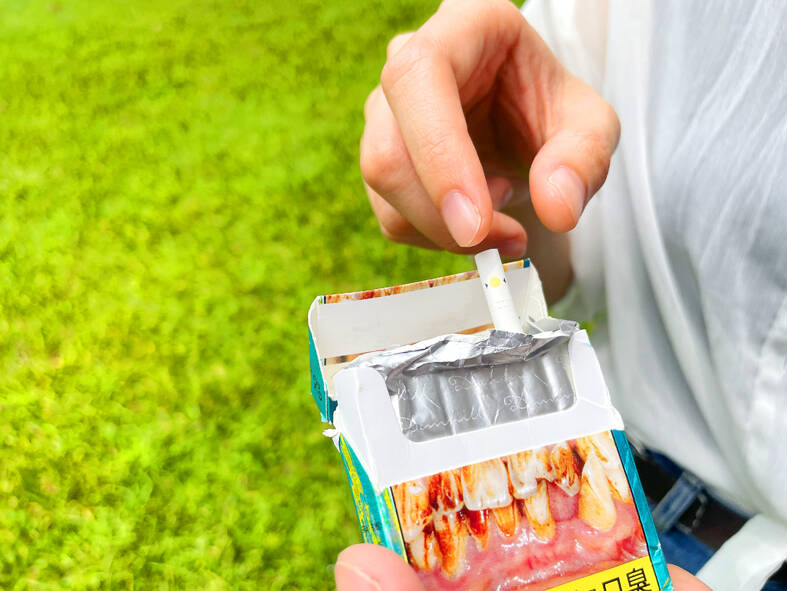The Ministry of Health and Welfare yesterday unveiled a preview of proposed regulations to ban 27 types of chemicals from being used in tobacco products, including cigarettes, vapes and heat-not-burn devices.
A previous version of the ban targeting only mint, floral, fruit and chocolate-flavored tobacco products was withdrawn amid criticism from groups that oppose smoking, who said that the proposed regulations were too narrow.
Lo Su-ying (羅素英), who heads the Health Promotion Agency’s Tobacco Control Division, said that the new proposal would enable the ministry to remove more than half of flavored tobacco products from the market.

Photo: Lin Chih-yi, Taipei Times
Amendments to the Tobacco Hazards Prevention Act (菸害防制法) promulgated last year authorize the government to prohibit specific types of chemical compounds in tobacco products, Lo said.
The list includes vanillin, maltol and heliotropin among other chemical compounds commonly used as additives in flavored tobacco products, she said.
Flavors such as caramel, butter, almond, rose, coconut, raspberry, vanilla and cheese could not be produced without these substances, she said.
The manufacture and import of tobacco products containing the banned substances would result in a fine of NT$1 million to NT$5 million (US$30,826 to US$154,131), while their sale would be punishable by a fine of NT10,000 to NT$50,000, Lo said.
The amended regulations would enter a 60-day period of public consideration before taking effect, she said, adding that the government has no plans to impose fines or penalties immediately for tobacco users.
Lin Ching-li (林清麗), head of the John Tung Foundation’s tobacco control division, said that the foundation is not satisfied with the proposed changes, as they fail to reflect the intent of lawmakers to ban flavored tobacco products.
The ministry’s claims about removing a majority of flavored tobacco products from shelves were unquantified, Lin said, adding that the foundation estimates at least 1,200 varieties of such products are circulating in Taiwan.

ECHOVIRUS 11: The rate of enterovirus infections in northern Taiwan increased last week, with a four-year-old girl developing acute flaccid paralysis, the CDC said Two imported cases of chikungunya fever were reported last week, raising the total this year to 13 cases — the most for the same period in 18 years, the Centers for Disease Control (CDC) said yesterday. The two cases were a Taiwanese and a foreign national who both arrived from Indonesia, CDC Epidemic Intelligence Center Deputy Director Lee Chia-lin (李佳琳) said. The 13 cases reported this year are the most for the same period since chikungunya was added to the list of notifiable communicable diseases in October 2007, she said, adding that all the cases this year were imported, including 11 from

Prosecutors in New Taipei City yesterday indicted 31 individuals affiliated with the Chinese Nationalist Party (KMT) for allegedly forging thousands of signatures in recall campaigns targeting three Democratic Progressive Party (DPP) lawmakers. The indictments stem from investigations launched earlier this year after DPP lawmakers Su Chiao-hui (蘇巧慧) and Lee Kuen-cheng (李坤城) filed criminal complaints accusing campaign organizers of submitting false signatures in recall petitions against them. According to the New Taipei District Prosecutors Office, a total of 2,566 forged recall proposal forms in the initial proposer petition were found during the probe. Among those

The Mainland Affairs Council (MAC) today condemned the Chinese Communist Party (CCP) after the Czech officials confirmed that Chinese agents had surveilled Vice President Hsiao Bi-khim (蕭美琴) during her visit to Prague in March last year. Czech Military Intelligence director Petr Bartovsky yesterday said that Chinese operatives had attempted to create the conditions to carry out a demonstrative incident involving Hsiao, going as far as to plan a collision with her car. Hsiao was vice president-elect at the time. The MAC said that it has requested an explanation and demanded a public apology from Beijing. The CCP has repeatedly ignored the desires

The Ma-anshan Nuclear Power Plant’s license has expired and it cannot simply be restarted, the Executive Yuan said today, ahead of national debates on the nuclear power referendum. The No. 2 reactor at the Ma-anshan Nuclear Power Plant in Pingtung County was disconnected from the nation’s power grid and completely shut down on May 17, the day its license expired. The government would prioritize people’s safety and conduct necessary evaluations and checks if there is a need to extend the service life of the reactor, Executive Yuan spokeswoman Michelle Lee (李慧芝) told a news conference. Lee said that the referendum would read: “Do